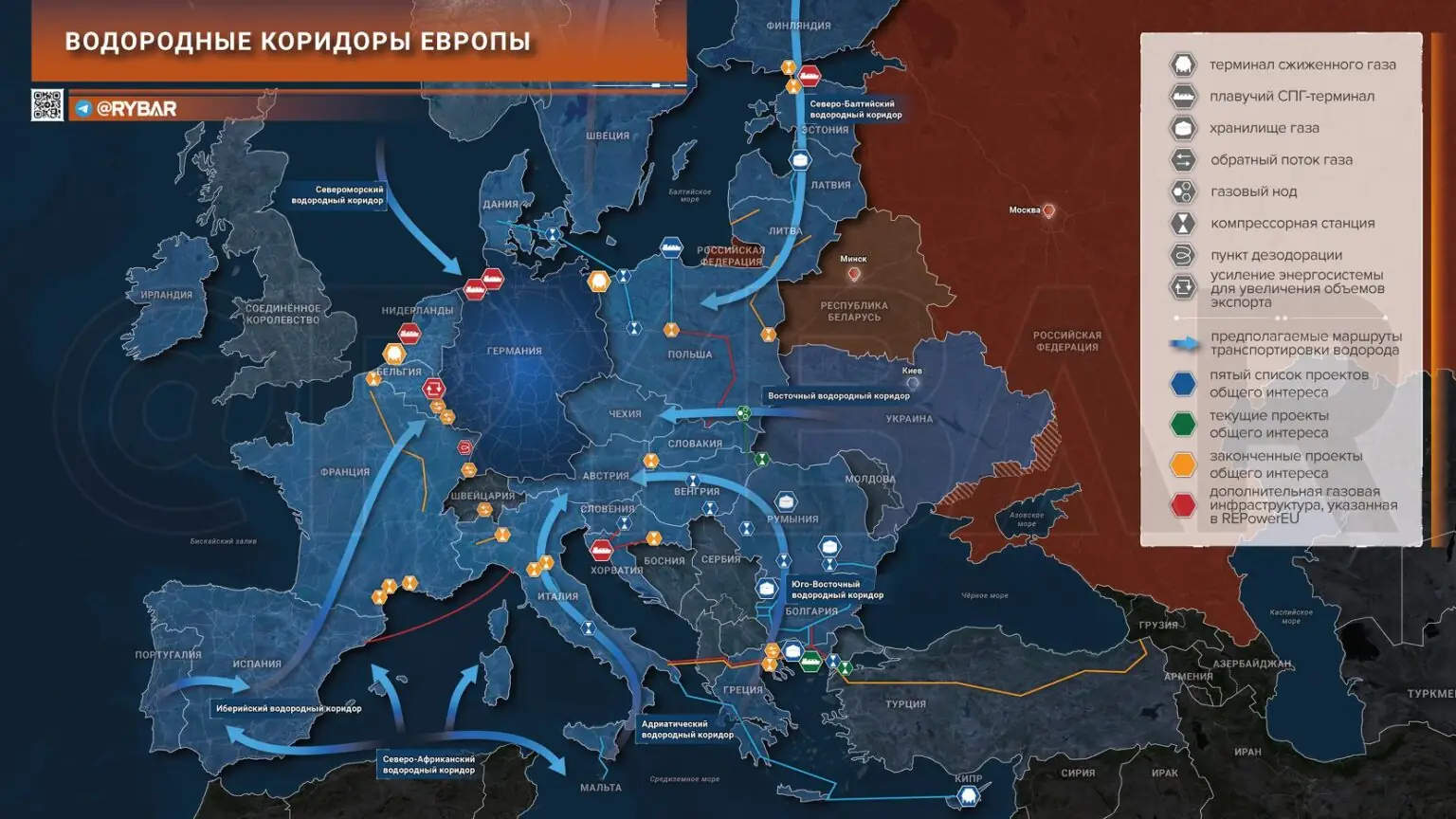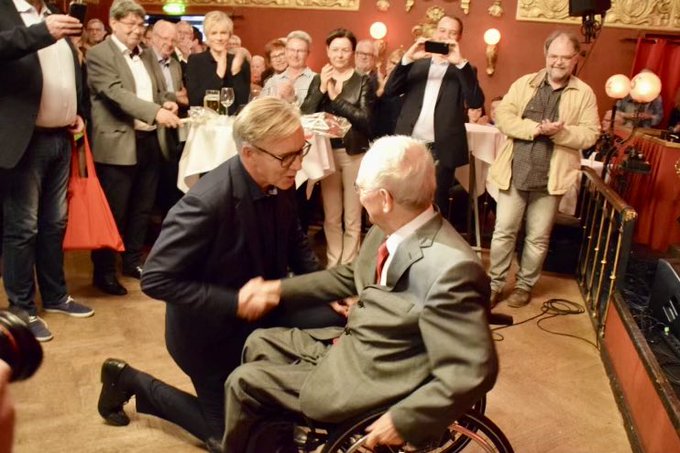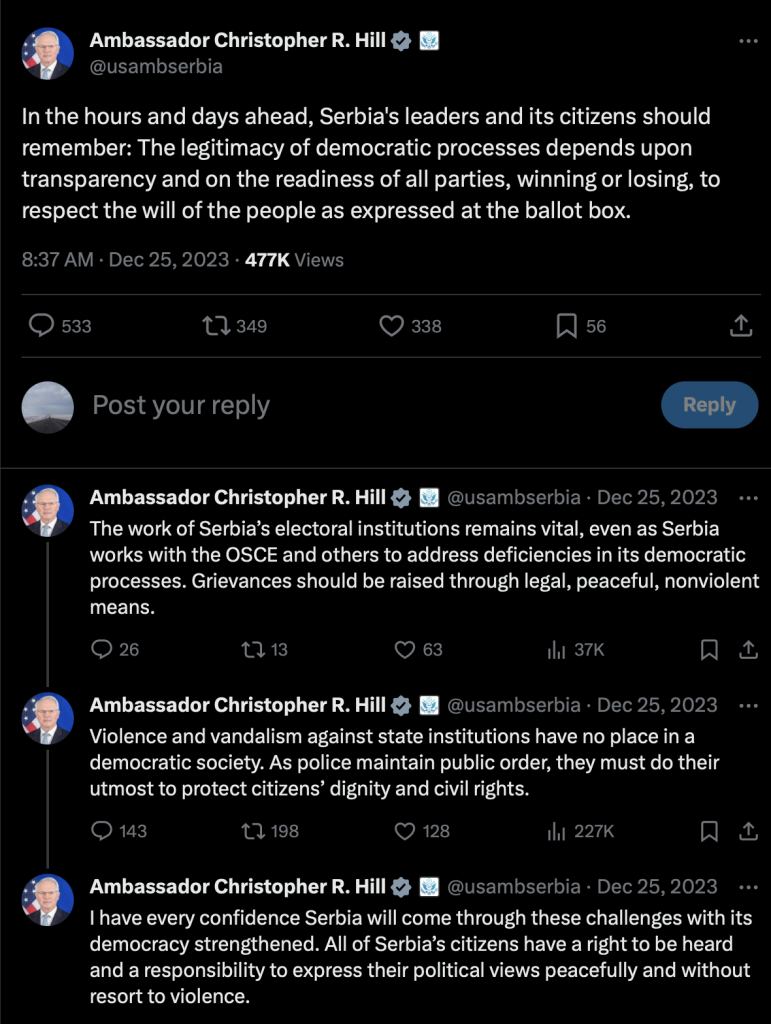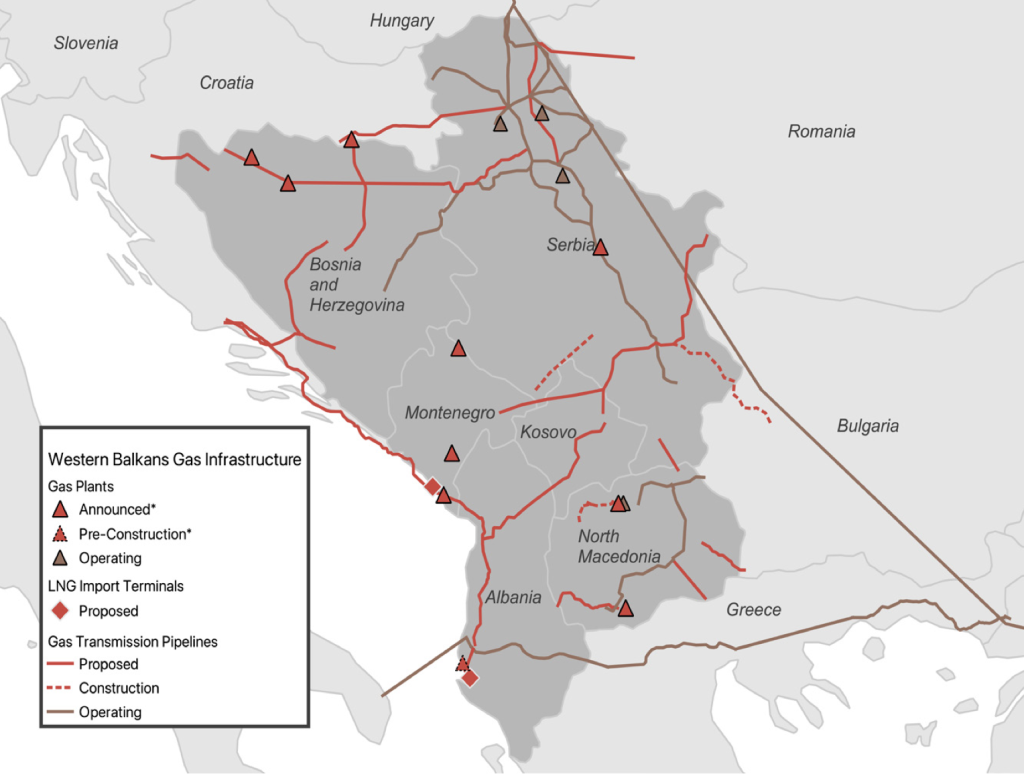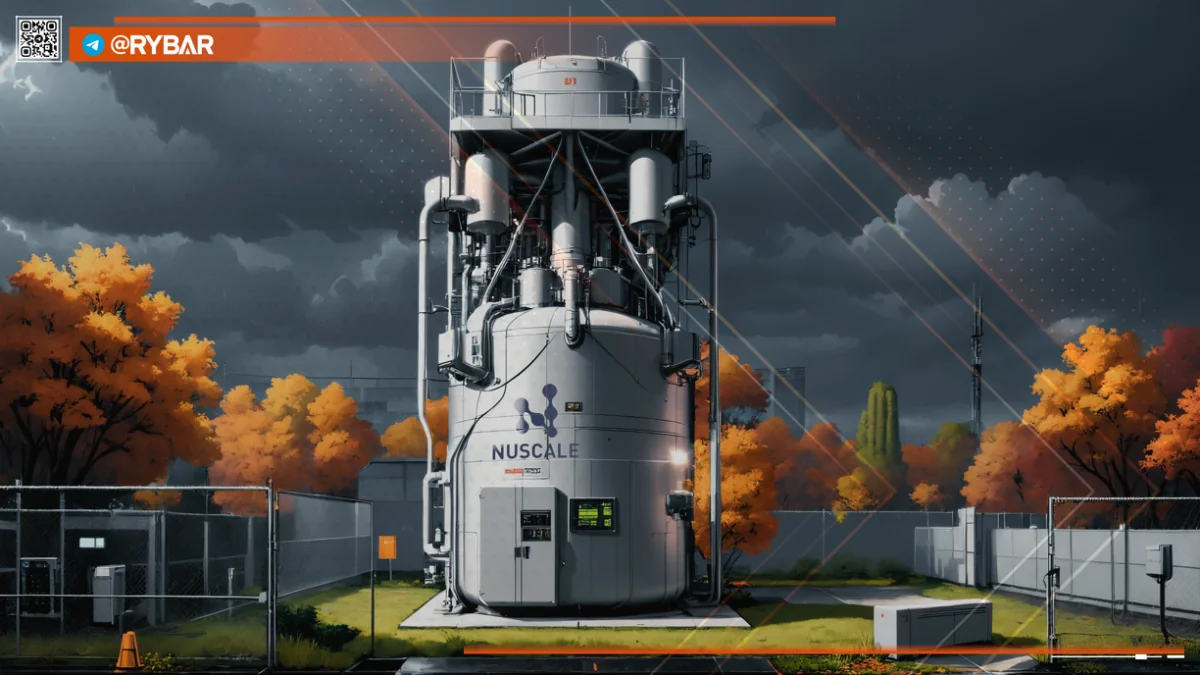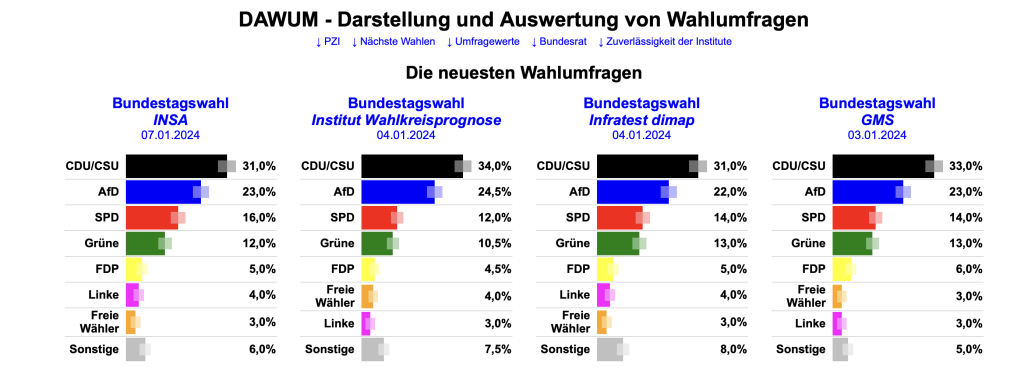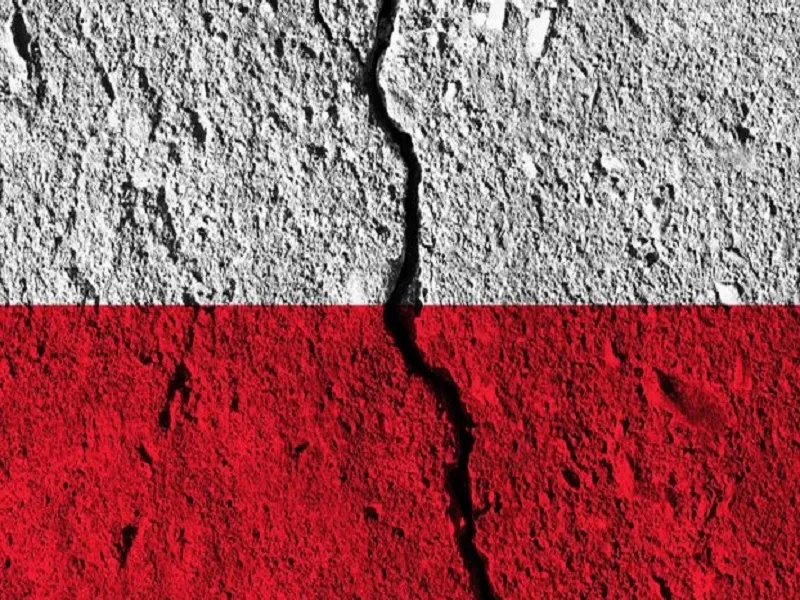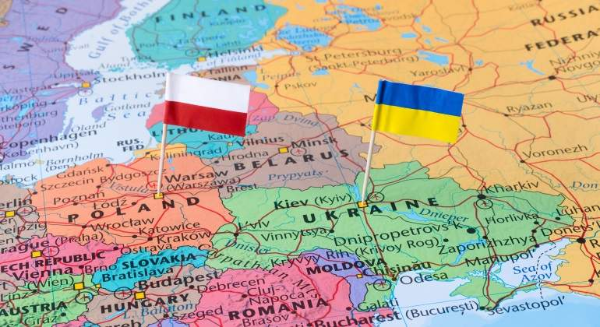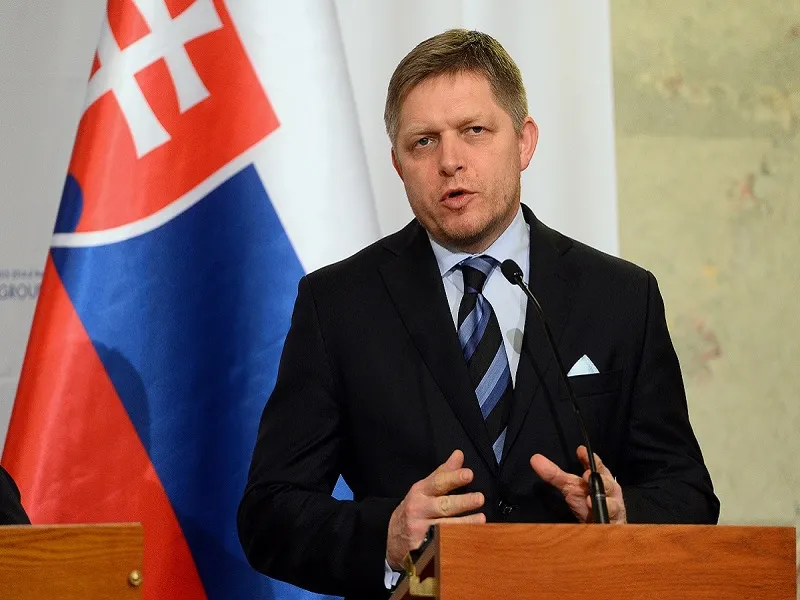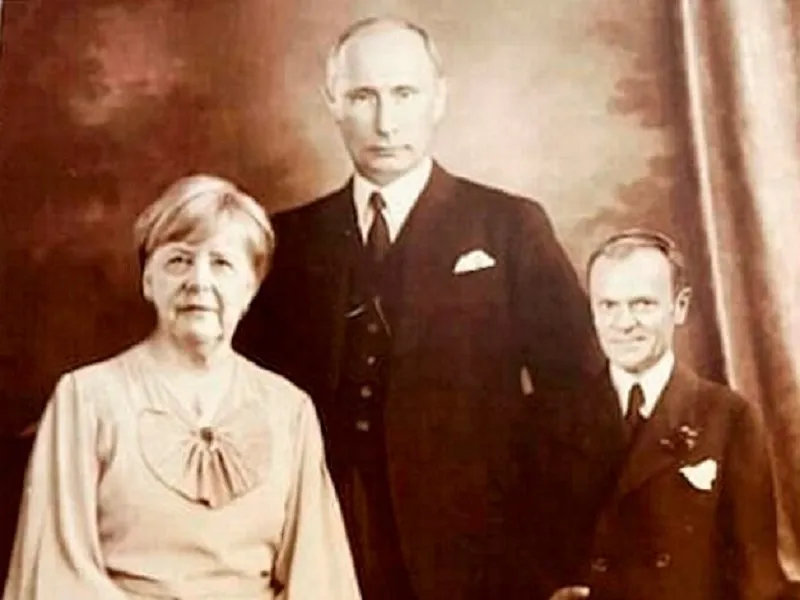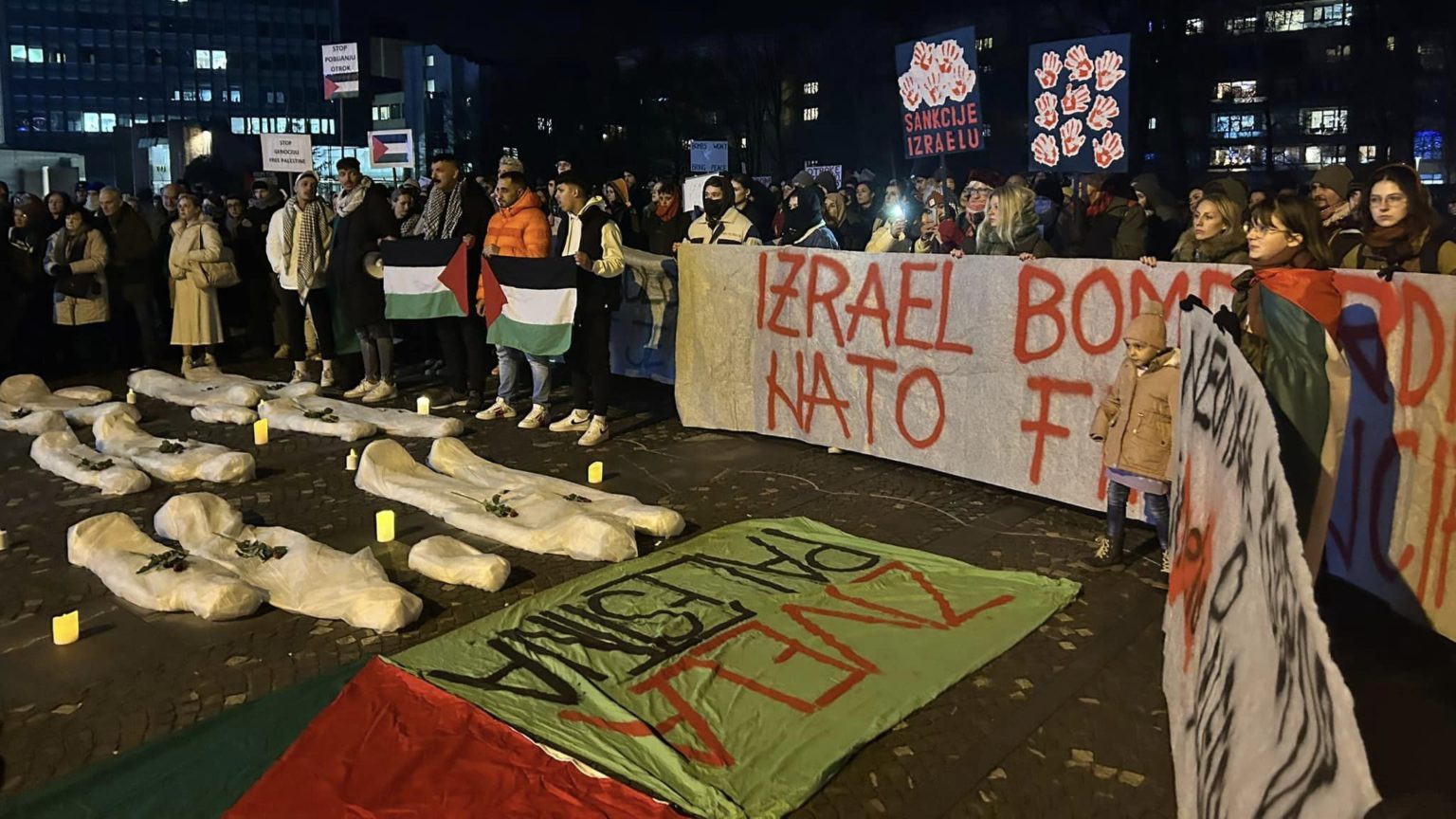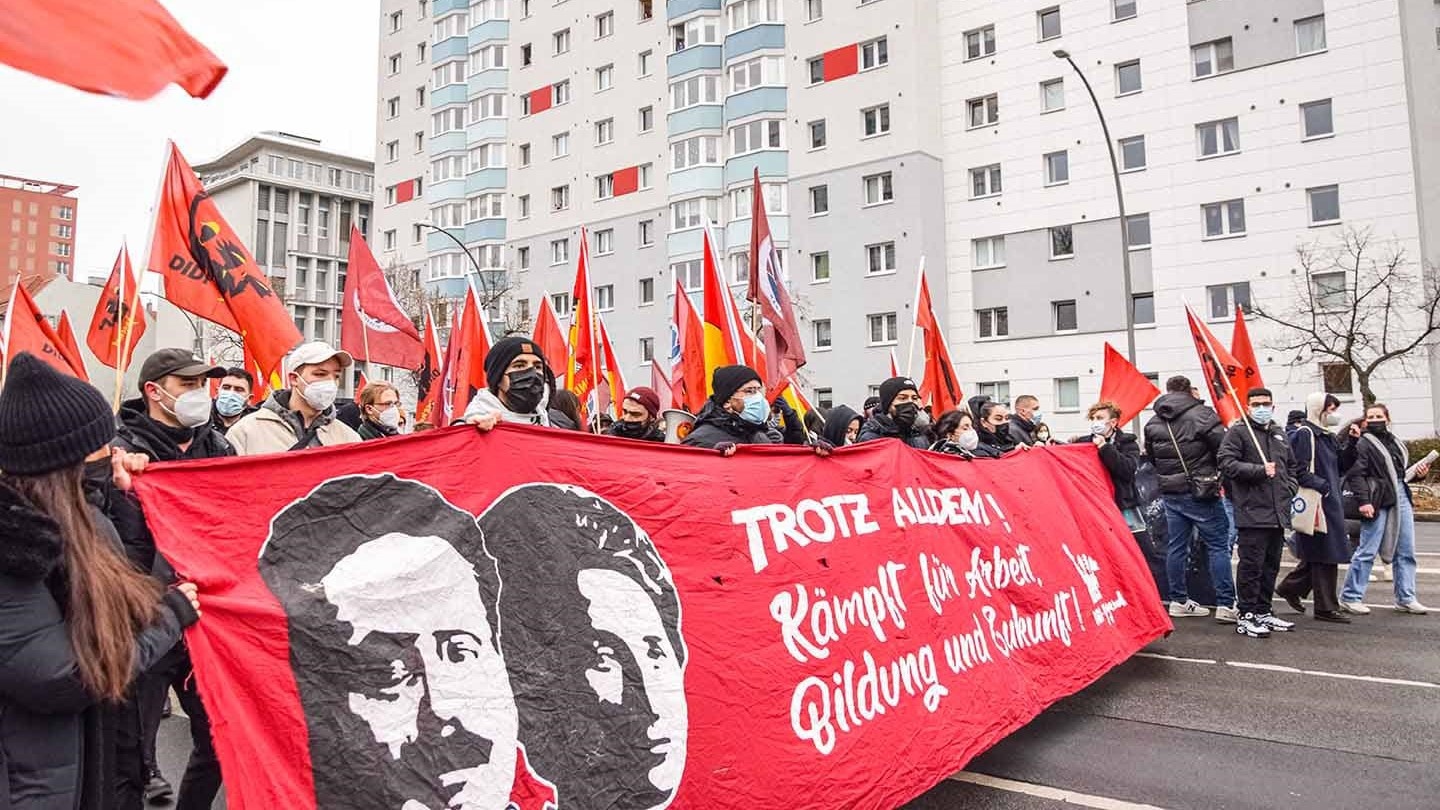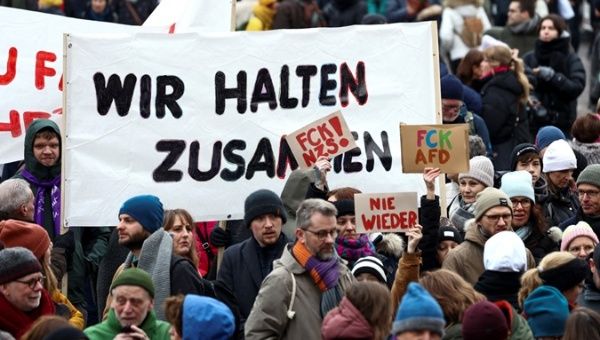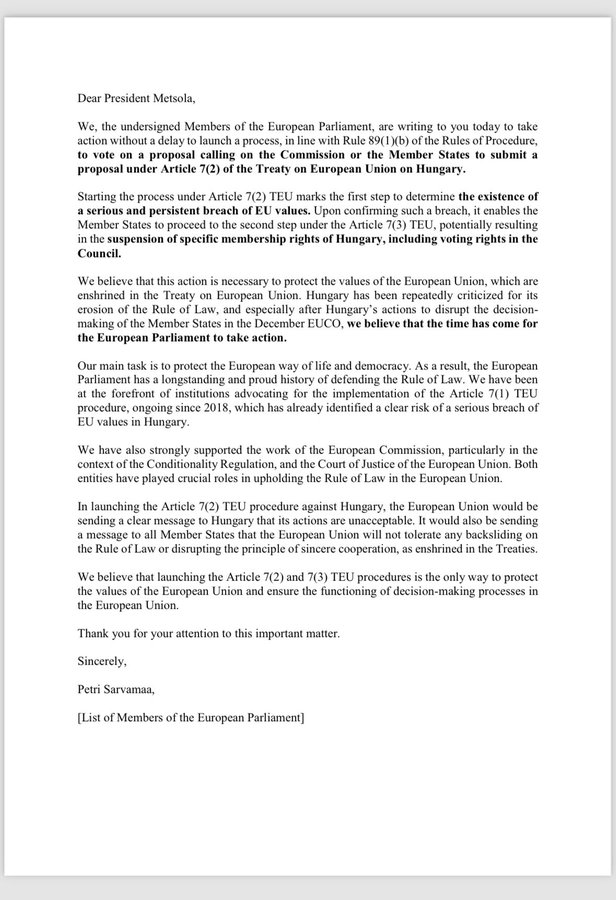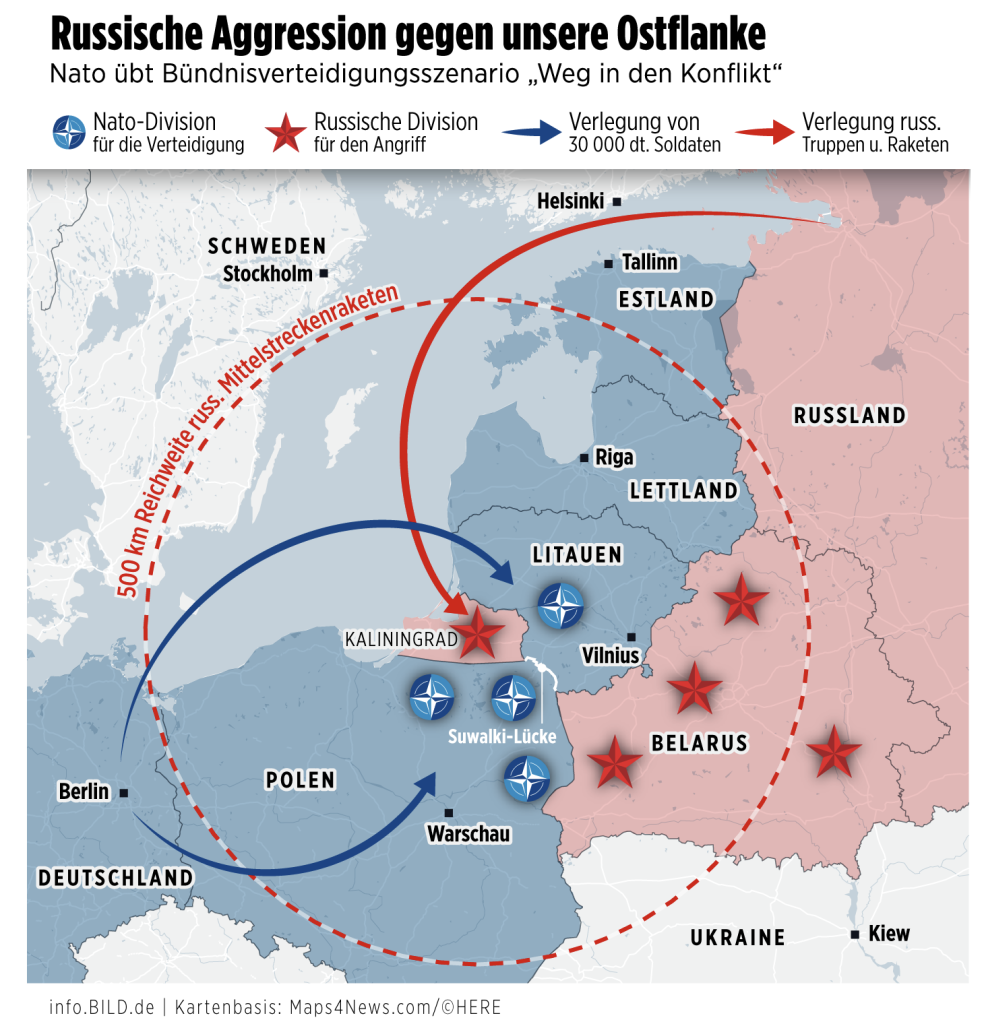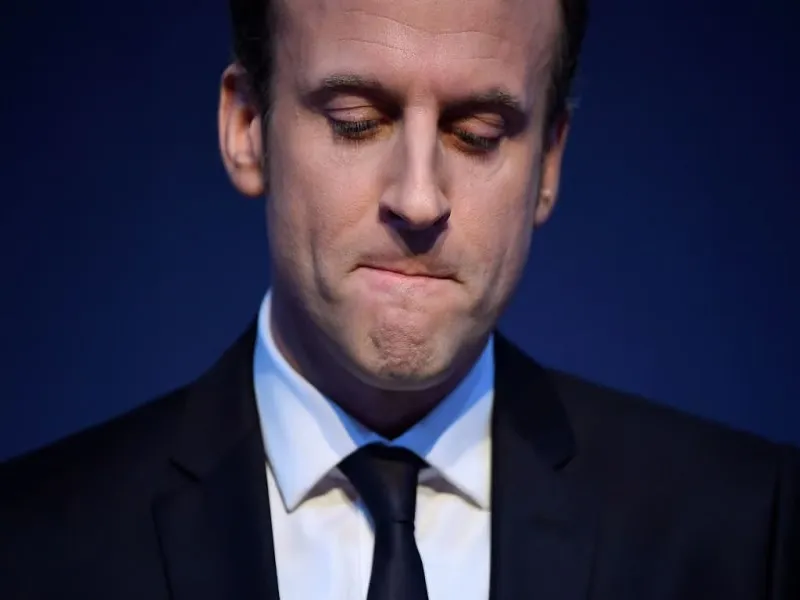All Is Permitted: A Failed Coup in Serbia?
By Kit Klarenberg - January 4, 2024 0

Protesters in Belgrade on December 30. [Source: msn.com]
On December 17th, Serbian voters went to the polls in a snap general election. The result was President Aleksandar Vucic’s ruling Serbian Progressive Party (SNS) coalition regained its parliamentary majority. Immediately, pro-Western, liberal opposition party Serbia Against Violence (SPN) declared widespread fraud in the government’s favor, and committed to convening protests around government buildings in Belgrade until authorities agreed to hold a new election.
So it was that thousands took to the streets, night after night. This culminated on December 24th with protesters, led by SPN leaders, attempting to forcibly gain access to Belgrade town hall, in scenes evocative of January 6th in Washington, D.C. What they hoped to achieve by breaching the building is unclear but, in a hugely symbolic twist, they were unable to do so and were fought back by riot police. About three dozen attendees were arrested for vandalism and violence.
The city has remained peaceful and calm ever since. Yet, these rather trivial events have been widely exploited by a variety of domestic and international actors to support conflicting narratives. For example, Russian state media have framed the disturbance as a Maidan 2.0 in the making, which Vladimir Putin personally averted by warning Vucic that Western-sponsored actors were plotting sedition.
The President himself has touted this alleged intervention, which plays into his persona as both a close confidante of the Kremlin, and defender of Serbs from foreign incursions. In reality, the protests were widely publicized in advance, overseas sponsorship of the groups and individuals involved was openly advertised, and there was zero prospect of the demonstrators achieving their stated goals, let alone unseating Vucic. As such, there was seemingly nothing to warn about.
One would not know that from Western media reporting on the events though, or the hysterical chorus of foreign “think tank” pundits, who claim a revolution is dawning in Belgrade. They grossly exaggerated the size of protest crowds and openly fantasized about the downfall of Vucic—whom they brand a Kremlin confidante, and Putin clone. In doing so, they perpetuate the false myth of eternal Serbian-Russian brotherhood, as the country is on the verge of being incorporated into the EU and NATO, despite widespread public opposition.

Aleksandar Vucic celebrating election victory. [Source: aljazeera.com]
The truth of what happened is at once more anodyne, and more sinister, than any of these narratives suggests. In effect, Belgrade’s Western-backed opposition tried to take on the country’s Western-backed government, and failed, because their Western sponsors did not want them to succeed. The only victor was the U.S. Empire. And the ultimate victims are the Serb public.
Revolution by Marketing
While the country may be small, Serbia is of enormous geopolitical significance. Throughout its history, multiple major powers have without success attempted to subjugate the country and its population. During the 1990s, relentless media demonization, Western-supported proxy wars in the former Yugoslavia, crippling international sanctions, an illegal 78-day-long NATO bombing campaign, and a U.S.-orchestrated coup immediately following that awful decade, were all concerned with finally achieving that end, for the U.S. Empire’s benefit.
After NATO criminally bombed Belgrade starting in March 1999, Yugoslavia’s long-time leader Slobodan Milosevic was ripe for removal. Accordingly, the National Endowment for Democracy (NED), a U.S. government regime-change agency that avowedly does overtly what the CIA once did covertly, USAID, and other U.S. government entities—including the CIA—began pumping tens of millions of dollars into ensuring his defeat in Yugoslavia’s September 2000 election.
As a Washington Post investigation documented in extraordinary detail in December that year, U.S. advertising whizzes typically accustomed to marketing chewing gum and soda pop were employed to concoct catchy slogans, PR stunts, and other innovative communications strategies to undermine Milosevic. Extensive opinion polling and countless focus groups were secretly conducted to road test and perfect campaign strategy in real time.
Concurrently, scores of parliamentary candidates and activists were covertly coached in the art of staying “on message” to field questions from journalists, and effectively rebut the arguments of Milosevic supporters. Extensive training and support were likewise provided to student activist collective Otpor (Serbian for “Resistance”). They learned how to organize strikes and protests, communicate publicly via symbols, “overcome fear,” and undermine government authority through disruptive, non-violent means.

Otpor-led protests in Serbia in color revolution directed against Milosevic. [Source: rferl.org]
USAID provided 5,000 cans of spray paint for student activists to daub anti-Milosevic graffiti across the country. Otpor employed “a wide range of sophisticated public relations techniques, including polling, leafleting and paid advertising” on Washington’s dime. All their messaging was informed by U.S.-financed polling, which meant “at every moment, we knew what to say to the people,” one of the group’s activists boasted. An Otpor leader explained in 2005:
“Our idea was to use corporate branding in politics. The movement has to have a marketing department. We took Coca-Cola as our model.”
When the election’s official results were announced, pointing to Milosevic’s victory, mass strikes spread throughout Serbia, while riots engulfed Belgrade with Otpor at the forefront, claiming industrial-scale electoral fraud. Such was the groundswell, the President resigned in October. Six months later, he was arrested and taken to The Hague to stand trial for alleged war crimes. Washington threatened to withhold financial aid from Yugoslavia if he remained free. Milosevic died in custody in March 2006, before his trial concluded. The aid never materialized.
Milosevic’s downfall is dubbed the “Bulldozer Revolution,” due to iconic scenes during the much-publicized unrest of a wheel loader helping anti-government agitators occupy state buildings, and shield activists from police bullets. In a perversely ironic twist though, its driver quickly turned against the “Revolution.” Subsequent Western-imposed privatization decimated Yugoslavia’s economy, causing his successful independent business to fail and for him to go bankrupt. He subsisted until his dying day on meager state welfare payments.

The bulldozer revolution bred disaster for Serbia. [Source: twistedsifter.com]
Stage-Managed Maidan
The legacy of the 1990s, and NED’s brazen actions, loom large today in Serbia. These events produced enduring national trauma, and widespread distrust of foreign meddling in Belgrade’s affairs among the overwhelming majority of the population. Serbs witnessed the same techniques of regime change used against them in 2000 that were redeployed in a series of “color revolutions” across the former Soviet sphere, which even Western foreign policy apparatchiks admit resulted in disaster for target countries.

[Source: mltoday.com]
As such, when on December 22nd a detailed, 24-page report on alleged fraud in the election was published by the Center for Research, Transparency and Accountability (CRTA), a Belgrade-based NGO, many Serbs worried that Western powers were cooking up a new “Bulldozer.” A cursory glance at the organization’s donors makes clear why. They are a veritable who’s who of foreign foundations, intelligence agency fronts, and Western embassies, notorious for sponsoring color revolutions. Among them, NED and USAID.

[Source: mediachecker.wordpress.com]
Those fears were only reinforced by some protesters openly brandishing banners bearing Otpor’s original logo, and in some cases the group’s name. They queasily nestled alongside signs intended for foreign audiences written in English, pleading for the West to come to the rescue, and EU flags. Such displays were absolute anathema to much of the public, greatly diminishing already limited sympathy for the opposition and demonstrators, and eliciting widespread calls to prevent “another Maidan” happening in Serbia.
It is now abundantly clear the protests lacked anything like the popular support necessary to pressure Vucic into an election rerun, much less force him from office. Most crucially though, their efforts were not endorsed by the U.S. embassy in Belgrade. On December 25th, Ambassador Christopher Hill issued a firm warning to the opposition to respect the official results, while harshly condemning the previous night’s violence and vandalism. The true ruler of Serbia had spoken. It was time for demonstrators to go home.

Christopher Hill [Source: cordmagazine.com]
However, the memo evidently was not universally received. Several Western news outlets, including the BBC and Politico, continued to report on the unrest as if it were not only ongoing, but intensifying, and city-spanning. Articles and video segments frequently featured images and footage of protesters attacking Belgrade’s City Hall, with little to no clarity that the scenes actually took place on December 24th. One can only speculate whether this was deliberate.

Image from Politico on apparent radicalization of protests. [Source: politico.eu]
Meanwhile, many foreign social media users shared photographs of the vast crowds gathered outside Serbia’s parliament, actually taken during opposition protests in May, falsely suggesting they were contemporaneous, and urging the EU and U.S. to support the “revolution.” These posts have in some cases gained enormous traction. Apparently no one thought to conduct a reverse image search, or noticed leaves of trees in the photos are luscious green, amply indicating the scenes were not taken in December.
While protests continued after Hill’s intervention, they typically attracted only a few hundred people, while a handful of students set up tents in central city streets in an attempt to block traffic. Parallels with the tent occupation of Ukraine’s Freedom—now Maidan—Square during Kyiv’s NED-sponsored “revolution of dignity” are not lost on Serbs. It is abundantly clear these efforts are exclusively intended for Western media consumption.

Students setting up tent city in attempt to replicate tent occupation of Ukraine’s Maidan Square uprising. [Source: voanews.com]
Nonetheless, the extrapolative impact of such images on foreign audiences should not be underestimated. After Maidan demonstrations erupted in November 2013, NED financed the creation of Hromadske TV, which livestreamed the protests. Its output was duly recycled by many mainstream news outlets in reporting on the rebellion in Kyiv. Foreign audiences were led to believe, based on Hromadske’s slanted coverage, the opposition was wholly energized by concerns over human rights and democracy, and overwhelmingly—if not universally—popular.

CIA/NED-backed propagandists who have sowed disaster for Ukraine. [Source: volnypost.com]
In fact, contemporary polls showed less than 20% of Maidan protesters were motivated by “violations of democracy or the threat of dictatorship,” Ukrainian President Viktor Yanukovych remained “the most popular political figure in the country,” and there was never overwhelming public support for the uprising. In fact, “quite large majorities” opposed it, due to “anti-Russian rhetoric and the iconography of western Ukrainian nationalism,” rife among demonstrators, “not [playing] well among the Ukrainian majority.”
One of the Serb student protesters arrested on December 24th, dubbed a “political prisoner” by the opposition and Western media, has now been released from custody, consigned to “house arrest” in his university dormitory. In several hagiographic interviews with foreign media, the flag of the Serbian Volunteer Corps, a fascist para-military group that collaborated with the Nazis during the genocidal Axis occupation of Yugoslavia, was displayed prominently on his bedroom wall.

[Source: twitter.com]
https://covertactionmagazine.com/2024/0 ... in-serbia/
(Much more at link.)
******
Will 2024 Mark the End of President Ursula Von Der Leyen?
Posted on January 5, 2024 by Nick Corbishley
With court cases and EU elections looming in the first half of the year, big question marks hang over the future of the EU Commission president.
Europe’s — and according to Forbes, the world’s — most powerful woman, Ursula von der Leyen (whom I will heretofore refer to as VdL), is in a bit of a jam. As Berliner Morgenpost reported this week, the European Commission president could be instructed by the European Union’s top court, the European Court of Justice (ECJ), to release all of her cellphone text messages pertaining to the mega COVID-19 vaccine deal she brokered with Pfizer CEO Albert Bourla in early 2021 (which may already have been deleted; she has form when it comes to destroying digital evidence).
The ECJ wants to reach a swift resolution to a lawsuit brought by the New York Times demanding the release of the messages. Meanwhile, the investigations, criminal or otherwise, against VdL’s Commission are stacking up.
“A Mistake of Strategic Proportions”
The article in the Berliner Morgen Post, titled “Text Messages Could Pose a Threat to Ursula von der Leyen,” provided a neat summary of VdL’s starring role in “Pfizergate” — arguably the most important political scandal in EU history — before exploring the growing disaffection in EU capitals over VdL’s go-it-alone approach to EU foreign policy, in which she has essentially arrogated to herself powers that have traditionally belonged to EU national governments (machine translated):
Von der Leyen has recently provoked considerable resentment in European capitals with her solo foreign policy moves. She promised [Ukraine] €50 billion euros without the consent of EU states, who would have to foot the bill. In Tunisia, she signed a preparatory migration agreement without first consulting the member states. And the fact that she deviated from the official EU line during her visit to Israel caused outrage in Brussels: she gave the Israeli government full support for its defence against the Hamas terrorist attacks, without, as agreed beforehand, insisting on respect for international law and the protection of the civilian population. A “mistake of strategic proportions,” complained diplomats in Brussels.
Even at this late stage in VdL’s mandate, it is rare for an article in Europe’s mainstream press to take VdL to task for her role in Pfizergate — which, for the sake of precision, should be known as Pfizer-BioNTechgate (I know, a bit of a mouthful) given that BioNTech was the original manufacturer of the mRNA vaccine. The Mainz-based pharmaceutical’s ties to the German federal government could not be closer, having been seed-funded and subsidised by successive Merkel administrations, of which VdL was the only constant member. Without this support, the firm may never have got off the ground, and probably would not have survived as long as it did (12 years) without selling a single product.
BioNTech’s ties with both Berlin and the VdL Commission remain strong. Just two weeks ago, VdL was accompanied by Germany’s Foreign Minister Annalena Baerbock on a state visit to Rwanda, where they opened BioNTech’s first mRNA vaccine factory in Africa. The factory was part-financed with EU funds. As Rwanda’s President Paul Kagame said during the factory’s inauguration, “The European Union, and President von der Leyen personally, helped to make this a reality.” In other words, as the criminal investigations into Pfizer-BioNTech continue, VdL’s Commission continues to funnel scarce EU funds in BioNTech’s direction.
Speaking at a recent event organised by the Brussels-based strategic consultancy SEC Newgate, the EU Ombudsman, Emily O’Reilly, lambasted European media for failing to investigate and report on EU corruption during VdL’s mandate. In 2022, O’Reilly accused VdL’s Commission of maladministration over the Pfizergate scandal, to little avail. The EU Ombudsman has, in O’Reilly’s words, “recommendatory powers only,” and has no legal means of holding VdL accountable besides stating the facts and asking for recourse.
From European Conservative, ironically one of precious few European media outlets that actually covered O’Reilly’s speech:
That’s why O’Reilly turned to the media at a recent event held by the Brussels-based strategic consultancy SEC Newgate, wondering why journalists seem to hold back when it comes to von der Leyen and possibly the biggest corruption scandal in the history of the EU.
While acknowledging that the Commission’s strategy to “stonewall” the media makes it hard for journalists to hold von der Leyen accountable for anything, O’Reilly said she was “amazed [at how] such a prominent figure as von der Leyen isn’t questioned harder on her missing Pfizer texts.”
A Story of Two Scandals
The media silence is particularly striking given the much greater attention devoted to the Qatargate scandal involving the European Parliament, an institution that wields far less influence and power than the Commission. The resulting probe into the current and former MEPs and parliamentary assistants implicated in the bribery ring scandal now appears to have bogged down, according to the Financial Times.
Qatargate may be the EU’s biggest graft scandal in decades but its implications pale in significance to those of Pfizergate, as I noted in my December 16, 2022 post, Will the Fallout from “Qatargate” Splatter the EU Commission?:
In contrast to Qatargate, [Pfizergate] has been studiously ignored by Europe’s legacy media despite the staggering sums of money involved (tens of billions of dollars to date to buy up to 1.8 billion COVID-19 vaccines), the number of people affected (anyone who pays taxes in the EU and felt compelled by the EU’s vaccine passport rules to take a medical product they didn’t want) and the seniority of those implicated, including Von der Leyen herself and Albert Bourla, CEO of Pfizer, one of the world’s largest pharmaceutical companies.
Von der Leyen herself has come under fire for concealing and/or deleting records of her conversations with Bourla prior to the Commission’s purchase of up to 1.8 billion vaccines. As for Bourla, he has twice refused to give testimony to a European Parliament special committee on the matter.
Now, the chickens could be coming home to roost for VdL, as the legal cases against her mount at the most sensitive of times in the political calendar — election year. Again, from the Berliner Morgenpost piece (machine translated):
The hearing before the ECJ will also focus attention on the investigations of other judicial authorities: The European Public Prosecutor’s Office has been investigating the Commission’s procurement of the corona vaccine for 15 months, and the result is expected in the first months of 2024. The trade expert and lobbyist Frederic Baldan has filed a criminal complaint against von der Leyen with the Belgian judiciary on allegations of corruption and destruction of documents in connection with the mega-deal and the SMS.
And a hearing in a Belgian court at the beginning of this year will also document the growing frustration of a number of mainly Eastern European countries regarding the conditions of the controversial Biontech deal. After rigourous protests, Pfizer agreed to extend the delivery period until 2027 and reduce the delivery quantity — but, according to insiders, a fee must be paid for each cancelled dose. This has hardly dampened the discontent of many EU countries. Pfizer has sued Poland and Hungary because they strictly refuse to pay for unneeded vaccine doses. At stake are billions of euros.
The legal aftermath of Corona hits von der Leyen at an inopportune time: in the year of the European elections. She will soon have to declare whether she will apply for a second term as Commission President. On March 7th, von der Leyen’s EPP party family will announce their top candidate for the European elections at a convention in Bucharest; there must be internal clarity well in advance. In Brussels , party friends, diplomats and Commission officials have so far assumed that von der Leyen would like to continue until 2029 – and would have a good chance of being re-elected if he ran.
VdL’s “Achievements”
The article then proceeds to list some of VdL’s achievements during her time in office, including the “Green Deal” she helped launch, her demonstration of the EU’s geopolitical ambitions in the Ukraine war, and the role she has played in EU crisis management. I would argue that the last two have been both resounding and hugely costly failures, as opposed to successes. The article then offers up this little gem:
“Von der Leyen is also praised by diplomats as the “most influential woman in Europe.”
Which begs the question: power for what purpose?
Creeping censorship, corruption, tech-enabled authoritarianism, rapid economic decline (much of it self inflicted), and supine support for US-backed economic, trade and military wars: these are the watchwords of VdL’s rule.
Indeed, if the Commission President was actually elected by EU citizens — as opposed to being selected for the role by national EU leaders after weeks of backroom horse-trading and then presented to the European Parliament to seal the deal — VdL wouldn’t have a hope in hell of being reelected in June. She only mustered a razor thin majority in the European Parliament first time round, despite being the only candidate on the ballot and enjoying the full support of Europe’s two most powerful national leaders, Angela Merkel and Emmanuel Macron.
While loved and feted in Washington (for obvious reasons), VdL has become a political liability in Brussels. Her political grouping in the European Parliament, the European People’s Party (EPP), has made assurances that it will support her candidature, but VdL cannot count on the unanimous support of the 27 national heads of state and government for her re-election. Hungarian Prime Minister Viktor Orban, having suffered numerous budgetary privations at the hands of the VdL Commission, has already threatened to veto a second term in office. As the BM article notes, alternatives are being considered in Brussels’ hallowed halls of power.
But even that, alas, is unlikely to spell the end of VdL’s political career. The only thing that could accomplish that would be an emphatic ruling or charges against her in one of the trials or investigations she faces, which is fairly unlikely. Vdl has a rare talent for failing upwards, so even if she fails to secure a second term as EU Commission president, she will probably land a new one that is at least as good, if not better — such as, say, NATO chief. She has already shown a taste for war and is so beholden to US interests that Politico called her “Europe’s American President.” Plus, Joe Biden is apparently keen for her to fill the role.
With or without VdL as Commission president, the outlook for the EU is decidedly grim. While much of the rot had already set in before VdL’s mandate, with the US-sparked Global Financial Crisis playing a key role as catalyst, her presidency has certainly helped to accelerate the decline. During her reign, the EU’s economy was thrust into a death spiral of de-industrialisation by the war in Ukraine and the EU’s self-harming sanctions on Russia, of which she is one of the most strident proponents. This, in turn, will help render the EU even more of a US vassal state, which was a key goal of project Ukraine all along.
The EU’s decline will almost certainly continue regardless of who takes over the reins. According to Berliner Morgenpost, one possible candidate is (cue drum roll…) Mario Draghi. The former Goldman Sachs banker has already proven himself to be a faithful servant of transatlantic banking and corporate interests, not only as governor of the Bank of Italy and the ECB but also as prime minister of Italy. The 76-year old technocrat already appears to enjoy the approval of Emmanuel Macron, the man who, together with Merkel, helped engineer VdL’s rise from disgraced German minister of defence to European Commission president. Draghi himself says he’s not interested in the job, but that’s exactly what you’d expect him to say.
https://www.nakedcapitalism.com/2024/01 ... leyen.html


